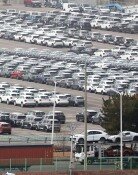Economic Zone Plan a Disappointment
Economic Zone Plan a Disappointment
Posted July. 03, 2006 03:28,
Free economic zones, established this month three years ago, are failing to live up to their initial promises.
Under the Free Economic Zone Act that went into effect on July 1 of 2003, the government designated Incheon, Busan to Jinhae, and Gwangyang Bay area as free economic zones, modeled on Pudong in Shanghai, China and Dubai, the UAE as part of a plan to make Korea a hub of Northeast Asia.
However, the governments dream of making Korea a hub of Northeast Asia seems far away for now.
Even the Ministry of Finance and Economy (MOFE) recently released a third anniversary interim report on the free economic zones, saying, The Korean free economic zones are not yielding profound success compared with Dubai and Pudong districts, due to the acceleration of competition for developing hub among countries and failure to concentrate national capabilities.
The report cited three major problems to be mediocre deregulation efforts such as excessive administrative procedures, regulation in the metropolitan area, and financial burdens, poor performance in attracting corporations through developer, and disparity in views between the central government and local governments.
In an email interview with Dong-A Ilbo, Stanley Gale, a Chairman of Gale International and developer for Incheon international business center, said, A foreigner having trouble with business approval means that it is hard for the company to do business here and this should be reformed immediately.
Foreign investment is also far from a success because of insufficient one-stop services, relatively high taxes and land prices, lack of infrastructures, and domestic large corporations reluctance to move to the zones.
The MOFE found that as of the end of May, a total of 18 companies signed formal contracts worth $17.18 billion in the three free economic zones. However, four of them are developers establishing infrastructure so the actual number of companies operating in the zones are 14 with $2.885 billion in business.
On the other hand, Jebel Ali Free Zone (JAFZ) in Dubai attracted a whopping 2,700 companies by 2004 since it was designated in 1985 and the companies doing business there are all global giants such as Sony, Philips, Nokia and Samsung.
Even in Pudong, 300 out of the worlds top 500 corporations are operating.
In addition, Korea has a problem with its reckless and sprawling national land development projects, resulting in the governments capabilities and attention away from the free economic zones.
A senior researcher at Samsung Economic Research Institute (SERI) Park Yong-kyu noted, Free economic zones are not very effective as various regional development projects, including three free economic zones and corporate cities shift the governments driving force away from the zones, and pointed out that the Korean free economic zones are now nothing special.
Regarding the matter, the head of free economic zone planning division of MOFE, Cho Sung-ik, noted, The MOFE will speed up its work to make up for some problems and make at least one successful model by around 2008.
Sun-Woo Kim Hyun-Jin Park sublime@donga.com witness@donga.com







